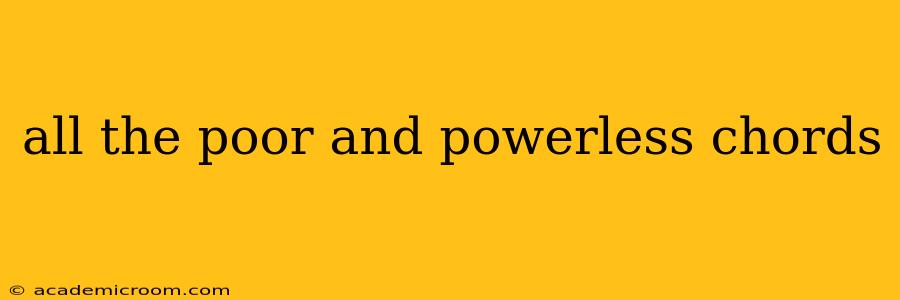All the Poor and Powerless Chords: Exploring Musical Themes of Vulnerability and Strength
The phrase "poor and powerless chords" evokes a powerful image: a musical landscape reflecting feelings of vulnerability, fragility, and the lack of agency. But what exactly constitutes a "poor and powerless chord"? It's not a technical musical term, but rather a descriptive phrase capturing the emotional impact of certain harmonic progressions and voicings. This exploration will delve into the musical elements that contribute to this feeling, considering both the theoretical and emotional aspects of music.
What Makes a Chord Sound "Poor" or "Powerless"?
This isn't about objectively "bad" chords; dissonance and unexpected harmonies are often powerful tools in music. Instead, the "poorness" lies in the emotional context and harmonic choices. Several factors contribute to this effect:
-
Minor Chords and Their Variations: Minor chords inherently carry a sense of sadness, melancholy, or vulnerability. Diminished chords, with their unstable and unresolved nature, amplify this feeling of powerlessness. Augmented chords, while often used for dramatic effect, can also express tension and anxiety, further contributing to a sense of unease.
-
Open Voicings and Sparse Textures: Chords played with large intervals or sparse voicings can sound fragile and exposed. This contrasts with the richness and fullness of closely-voiced, powerful chords. The emptiness surrounding the notes can symbolize isolation and lack of support.
-
Descending Basslines: A bassline moving downwards, especially in stepwise motion, often creates a sense of descent or decline, reflecting feelings of loss or powerlessness.
-
Chromaticism and Passing Chords: The use of chromatic notes or passing chords that resolve weakly or don't fully resolve can create a sense of aimlessness and instability, mirroring a lack of control.
-
Harmonic Minor Scale: The use of the harmonic minor scale, especially its characteristic raised 7th, can create a dramatic and sometimes unsettling effect, heightening the sense of unease or tension.
How Are "Poor and Powerless Chords" Used in Music?
Composers and songwriters deliberately use these musical elements to convey specific emotions. They are often found in:
- Film Scores: To underscore scenes depicting despair, oppression, or vulnerability.
- Classical Music: In works exploring themes of suffering, loss, or introspection.
- Folk and Blues Music: To express the hardships and struggles of everyday life.
- Contemporary Music: To create a sense of unease, fragility, or introspection.
What are some examples of music using these chords?
While pinpointing specific chords as definitively "poor and powerless" is subjective, consider the frequent use of minor chords and diminished chords in many genres. Many pieces by composers like Samuel Barber, Gustav Mahler, and Arvo Pärt effectively utilize harmonic ambiguity and sparse textures to create emotionally resonant and affecting works. Similarly, the blues genre uses minor chords and blue notes to create a sound often associated with heartache and struggle.
Can "Poor and Powerless Chords" also convey strength?
Paradoxically, yes. The juxtaposition of these "powerless" chords with more powerful ones, or their use in a context that emphasizes resilience, can ultimately enhance the feeling of strength. The vulnerability expressed through these chords can create a powerful contrast, ultimately making statements of overcoming adversity all the more impactful. Think of the use of minor keys in powerful anthems – the initial vulnerability can make the ultimate triumph feel even more significant.
This exploration of "poor and powerless chords" highlights the subtle and powerful ways music can communicate emotion. While not a technical term, the phrase accurately captures the evocative potential of certain harmonic choices and their ability to express vulnerability, strength, and the complex human experience. The key is understanding the context and the composer's intentions – the seeming weakness of these chords can be their greatest strength.
